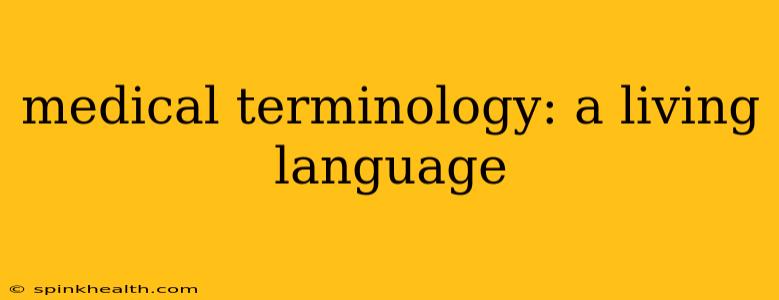Medical Terminology: A Living Language – Ever Evolving and Expanding
Medical terminology, far from being a static collection of obscure words, is a vibrant, dynamic language constantly evolving to reflect advancements in medicine and our understanding of the human body. It's a living language, shaped by scientific discoveries, technological innovations, and the ever-increasing complexity of healthcare. Imagine it like this: a bustling city, where new words are constantly being built, while older ones are renovated or even demolished to make way for more accurate and efficient terms.
This ever-changing landscape can be daunting, even for seasoned medical professionals. However, understanding the underlying principles of medical terminology is key to navigating this complex world and effectively communicating within the healthcare system. Think of it as learning the grammar and vocabulary of a new language, with the added bonus of understanding the human body in the process.
What are the main components of medical terminology?
Medical terminology draws heavily from Greek and Latin roots, prefixes, and suffixes. These building blocks combine to create precise and unambiguous terms. Learning these components empowers you to decipher the meaning of even unfamiliar medical words, transforming seemingly cryptic phrases into clear and concise descriptions. For example, understanding that "cardio" refers to the heart and "-logy" signifies the study of, quickly allows you to understand that "cardiology" is the study of the heart. This deconstruction is the key to unlocking the language of medicine.
How does medical terminology change over time?
Medical knowledge is not static; it progresses constantly. As new diseases are identified, new treatments are developed, and our understanding of the human body deepens, so too does medical terminology. New terms are coined to describe these advancements, while older terms may become obsolete or their meanings refined. This reflects the dynamic nature of medical research and its constant quest for greater precision and accuracy in describing medical conditions and treatments. The language adapts to keep pace with the science.
Why is understanding medical terminology important for patients?
For patients, understanding medical terminology isn't just about sounding knowledgeable; it's about empowerment. Being able to understand your diagnosis, treatment plan, and medication instructions allows for better communication with healthcare providers and promotes active participation in your own care. This active engagement improves patient outcomes and fosters trust between patients and their medical teams.
What are some common prefixes, suffixes, and root words in medical terminology?
Let's explore some common examples. Prefixes such as "hypo-" (under, below) or "hyper-" (above, excessive) modify the meaning of a root word. Suffixes such as "-itis" (inflammation) or "-ectomy" (surgical removal) further specify the nature of a condition or procedure. Root words like "gastr-" (stomach) or "hepat-" (liver) provide the core meaning of a term. Combining these elements creates a rich vocabulary used to describe the full spectrum of medical conditions, treatments, and procedures.
How can I learn medical terminology effectively?
Learning medical terminology is a journey, not a sprint. Start by focusing on basic prefixes, suffixes, and root words. Use flashcards, online resources, and medical dictionaries to build your vocabulary. Regular practice is key, whether it's through reading medical texts, watching medical documentaries, or engaging in conversations with healthcare professionals. Remember, understanding the building blocks allows you to understand a much larger vocabulary.
What are some resources for learning medical terminology?
Numerous resources are available to assist in mastering medical terminology. These range from textbooks and online courses to medical dictionaries and glossaries. Many online platforms offer interactive exercises and quizzes to reinforce learning.
In conclusion, medical terminology is a living language reflecting the ever-evolving field of medicine. Mastering its fundamental elements empowers patients, healthcare professionals, and anyone interested in understanding the human body and its complexities. It's a journey of discovery, rewarding the effort invested in unraveling its intricacies. The ability to interpret medical jargon can significantly improve healthcare interactions and improve understanding across the board.

